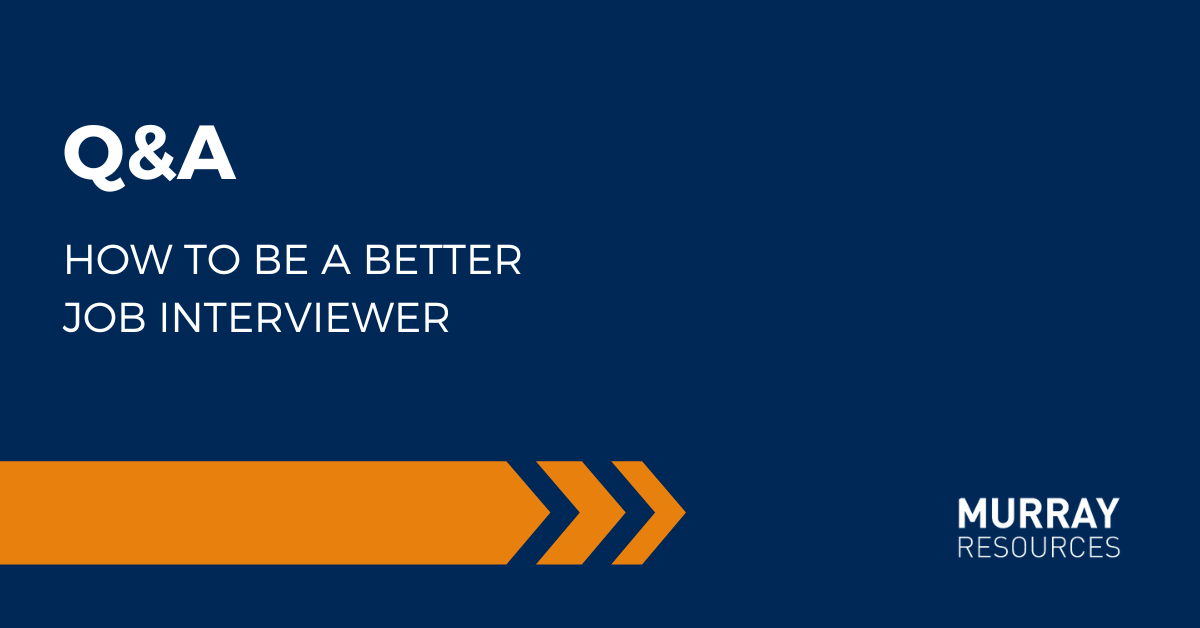How to Be a Better Job Interviewer (5 Tips From a Recruiting Firm)
December 9, 2024

Wondering how to be a better job interviewer? Whether you’re new to interviewing or looking to refine your approach, this guide offers practical, expert-backed tips to help you take your interviewing game to the next level. From asking the right questions to creating a comfortable atmosphere and evaluating candidates more effectively, these strategies will help you identify top talent and make smarter hiring decisions.
Key Takeaways
- Set clear interview objectives to focus on relevant skills, qualifications, and cultural fit, ensuring a targeted and efficient interview.
- Ask strategic, open-ended questions to dive deeper into candidates’ experiences and problem-solving abilities, avoiding generic questions.
- Create a balanced conversation by using light, open-ended questions and allowing candidates to share stories, offering valuable insights into their potential.
1. Set Clear Interview Objectives to Find the Right Candidate

Before conducting an interview, it’s essential to define your goals. Having a clear understanding of what you need to assess will help you focus on the specific skills, experience, and personal traits that are most relevant to the role. Setting clear objectives enables a more structured and targeted questioning process.
👉 Here are few questions to get your objective rolling:
- What specific skills and qualifications are most important for success in this role?
- What key experiences or background should the ideal candidate have to excel?
- What personal traits or values are essential for a candidate to fit into our company culture?
- How will the candidate’s performance be measured in this role, and what outcomes are we aiming for?
- What are the top challenges or opportunities this role presents, and how can a candidate demonstrate their ability to handle them?
Without a strategy, interviews can become disorganized and less productive. Clearly defined objectives give you measurable benchmarks, ensuring that each interview is purposeful and leads to informed, confident hiring decisions. This approach not only improves your hiring process but also helps attract top talent that fits your organization’s needs.
💡 In addition to having a clear interview strategy, creating a transparent and detailed job description is equally important. A well-crafted job description helps align both the interviewer and the candidate from the start. By clearly outlining the responsibilities, required skills, and expectations, candidates can better assess their fit for the role, and you’ll be more equipped to ask the right questions based on their experience. To learn more on how to streamline your job descriptions, check out our blog, Is Your Job Post Scaring Away Top Talent? Tips to Attract the Best Candidates.
2. Develop Strategic Questions

Crafting the right interview questions is key to uncovering a candidate’s true potential. By asking targeted, open-ended questions, you can go beyond the resume to assess deeper qualities such as problem-solving abilities, cultural fit, and decision-making skills.
🔸Tip: Steer clear of generic questions that don’t reveal much about a candidate’s qualifications or experience. Instead, focus on questions that prompt candidates to share detailed examples of their work, like asking about a specific challenge they faced and how they overcame it.
👉 Here are some strategic questions to help guide your interviews:
- Can you tell me about a time when you faced a significant challenge at work? How did you approach it, and what was the outcome?
- Describe a situation where you had to make a tough decision with limited information. How did you handle it, and what was the result?
- How do you prioritize tasks when managing multiple deadlines? Can you share an example of how you’ve done this in a previous role?
- Tell me about a time when you had to collaborate with a team to achieve a goal. What role did you play, and how did you ensure success?
- How do you approach learning new skills or adapting to new technologies in your field? Can you give an example of a time when you successfully upskilled?
Elevate your interview process by designing relevant, thought-provoking questions that encourage candidates to elaborate on their experiences. This not only enhances the candidate experience but also helps you gather more valuable insights, leading to better hiring decisions.
Elevating Common Interview Questions
Standard interview questions can be more effective when their purpose is fully understood. Here are some common questions recruiters may typically use (and job candidates get tired of hearing) and how to elevate them to gain deeper insights into your candidates, and keep top talent enaged.
❌ “Tell me about yourself.”
This question often serves as an icebreaker, setting the tone for the conversation. It allows candidates to highlight the parts of their background they deem most relevant.
✅ “Tell me about yourself and how your experience has prepared you for this position.”
This version shifts the focus toward relevant qualifications and goals, allowing you to gauge both their experience and enthusiasm for the role.
❌ “Where do you see yourself in five years?”
A classic question to assess long-term goals, it tests whether a candidate’s professional vision aligns with the company’s trajectory.
✅ “Where do you see yourself in five years, and how do you think this role will help you get there?”
This version encourages candidates to connect their aspirations with the opportunities the role offers, helping you understand their potential growth within your company.
❌ “What’s your biggest weakness?”
This question examines self-awareness and honesty but often leads to generic or rehearsed answers.
✅ “What’s a professional skill you’re working to improve, and how are you actively developing it?”
This reframed question invites candidates to demonstrate self-awareness and a commitment to growth, offering more insight into their problem-solving abilities.
Understanding the purpose behind these questions allows you to adapt them for deeper conversations. By leveling up common questions, you’ll gather more valuable insights into a candidate’s career ambitions, self-awareness, and overall fit for the role and company culture. It’s all about being intentional with the questions and creating space for candidates to demonstrate their true potential.
3. Set the Right Tone from the Start

First impressions play a pivotal role in setting the tone for the entire interview. When candidates feel informed and prepared, they are more likely to engage confidently and perform at their best.
Begin by providing a clear interview roadmap:
- Outline the time expected for the interview
- Give a brief overview of the company
- Describe the role in question
This transparency helps candidates understand the structure of the conversation, reducing anxiety and allowing them to focus on the most important aspects of their qualifications.
💡 By giving candidates a sense of what to expect, you promote fairness and create a more comfortable atmosphere. This simple step can make a significant difference in how well candidates express themselves during the interview.
4. Focus on Listening and Observing

One of the most powerful interviewing techniques is focusing on listening and observing. Active listening shows that you’re engaged in the conversation and helps candidates feel valued and respected. By listening more than speaking, you allow candidates to fully express their skills, experiences, and potential.
Good eye contact is another essential element that signals attentiveness and interest, making the interaction more dynamic. Pair this with non-verbal cues, such as nodding or smiling, to show that you’re actively listening. These small gestures help candidates feel more at ease, encouraging them to open up and share their true selves.
🔸 Tip: To further demonstrate your engagement, paraphrasing or summarizing a candidate’s response can show that you understand and appreciate what they’ve said. This not only helps reinforce their points but also encourages deeper conversation.
Active listening and thoughtful observation create a positive, meaningful interview experience, ultimately providing you with valuable insights to inform your decision-making.
5. Conduct a Balanced Conversation

A successful job interview feels like a balanced conversation, not an interrogation. Light, open-ended questions help create a friendly atmosphere, ensuring candidates feel valued and have ample opportunity to talk about their thoughts.
👉 Here are some tips to enhance the experience:
- Ask open-ended questions to create a relaxed atmosphere and encourage candidates to share their experiences.
- Encourage storytelling to assess how candidates approach challenges and how they align with the role.
- Use follow-up questions to dive deeper into responses and gain more insight.
- Transition smoothly between topics to maintain a natural flow during the conversation.
- Incorporate behavioral questions to understand how candidates handled past situations.
- Ask situational questions to evaluate how candidates might approach future challenges in your workplace.
By maintaining a balanced conversation, you create an atmosphere where candidates feel comfortable sharing their true potential, leading to a more insightful and effective interview.
Summary
In this blog we’ve learned that becoming a better job interviewer involves more than just asking standard questions. By defining clear interview objectives, you can stay focused on assessing the right skills and qualities. Crafting strategic, open-ended questions allows you to dig deeper into a candidate’s true potential, beyond their resume. Setting the right tone from the start and actively listening helps candidates feel more comfortable and valued, leading to more authentic conversations. Finally, fostering a balanced, engaging dialogue ensures you gain valuable insights into each candidate’s fit for the role and company. By implementing these strategies, you’ll improve your interviewing process and make more confident, informed hiring decisions.
Q&A

Q: Why is it important to define interview goals?
A: It’s crucial to define interview goals because they guide your questioning and ensure you evaluate the right skills and attributes relevant to the job. This way, you make a well-informed hiring decision that fits both the role and your company culture.
Q: How can I develop more strategic interview questions?
A: To develop more strategic interview questions, aim for open-ended queries that examine a candidate’s problem-solving skills, cultural fit, and decision-making abilities. Also, make sure to customize these questions to align with the specific role you’re hiring for.
Q: How can I set the right tone for an interview?
A: To set the right tone for an interview, start by giving a clear roadmap that outlines the interview’s structure and briefly introduces the company and the role. This not only makes candidates feel prepared but also establishes a professional atmosphere.
Work with Houston’s Best Recruiting Firm
If you’re aiming to refine your interview techniques or seeking guidance on effective candidate assessment, Murray Resources can assist you. Our team of experienced recruiters specializes in understanding the nuances of effective interviewing and can help you optimize your recruitment strategy. Review our Job Openings or Contact us today to enhance your recruitment process and secure candidates who truly match your organizational needs.
